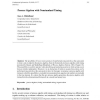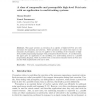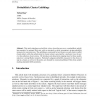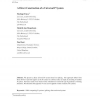65
Voted
FUIN
2002
15 years 16 days ago
2002
We study caterpillar tree automata [3] that are restricted to enter any subtree at most one time (or k times). We show that, somewhat surprisingly, the deterministic one-visit aut...
124
click to vote
FUIN
2002
15 years 16 days ago
2002
Biological research is currently undergoing a revolution. With the advent of microarray technology the behavior of thousands of genes can be measured simultaneously. This capabilit...
113
click to vote
FUIN
2002
15 years 16 days ago
2002
The possibility of two or more actions to be performed consecutively at the same point in time is not excluded in the process algebras from the framework of process algebras with t...
121
click to vote
FUIN
2002
15 years 16 days ago
2002
This paper presents an extension of an algebra of high-level Petri nets with operations for suspension and abortion. These operations are sound with respect to the semantics of pre...
FUIN
2002
15 years 16 days ago
2002
Abstract. This article introduces probabilistic cluster branching processes, a probabilistic unfolding semantics for untimed Petri nets, with no structural or safety assumptions, g...
109
click to vote
FUIN
2002
15 years 16 days ago
2002
The article describes a method combining two widely-used empirical approaches to learning from examples: rule induction and instance-based learning. In our algorithm (RIONA) decisi...
FUIN
2002
15 years 16 days ago
2002
In this paper we focus upon a comparison of some generalized rough approximations of sets, where the classical indiscernibility relation is generalized to any binary reflexive rela...
FUIN
2002
15 years 16 days ago
2002
We present a direct universal P system based on splicing. Our approach differs from those shown in previous papers as the P system we construct takes as input an encoding of anothe...
97
Voted
FUIN
2002
15 years 16 days ago
2002
Refinement in bisimulation semantics is defined differently from refinement in failure semantics: in bisimulation semantics refinement is based on simulations between labelled tran...
82
Voted
FUIN
2002
15 years 16 days ago
2002




